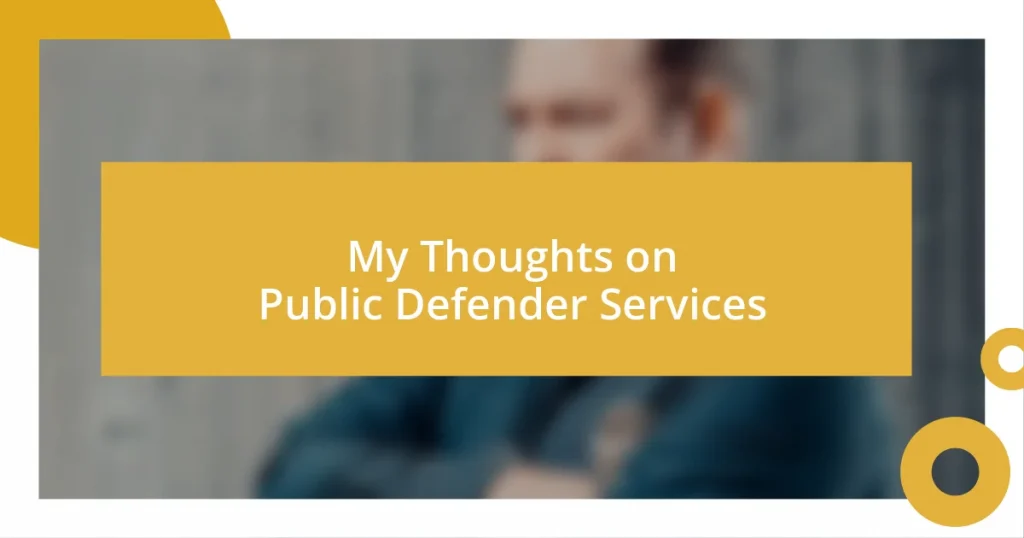Key takeaways:
- Public defenders are essential for providing equitable legal representation to low-income individuals, often working under significant pressure with heavy caseloads and limited resources.
- Despite facing stigma and challenges, public defenders show unwavering dedication to their clients, contributing both legal advocacy and emotional support through difficult legal processes.
- The future of public defender services requires urgent reform, including increased funding and leveraging technology to enhance case management and support for attorneys, ensuring justice for the accused.
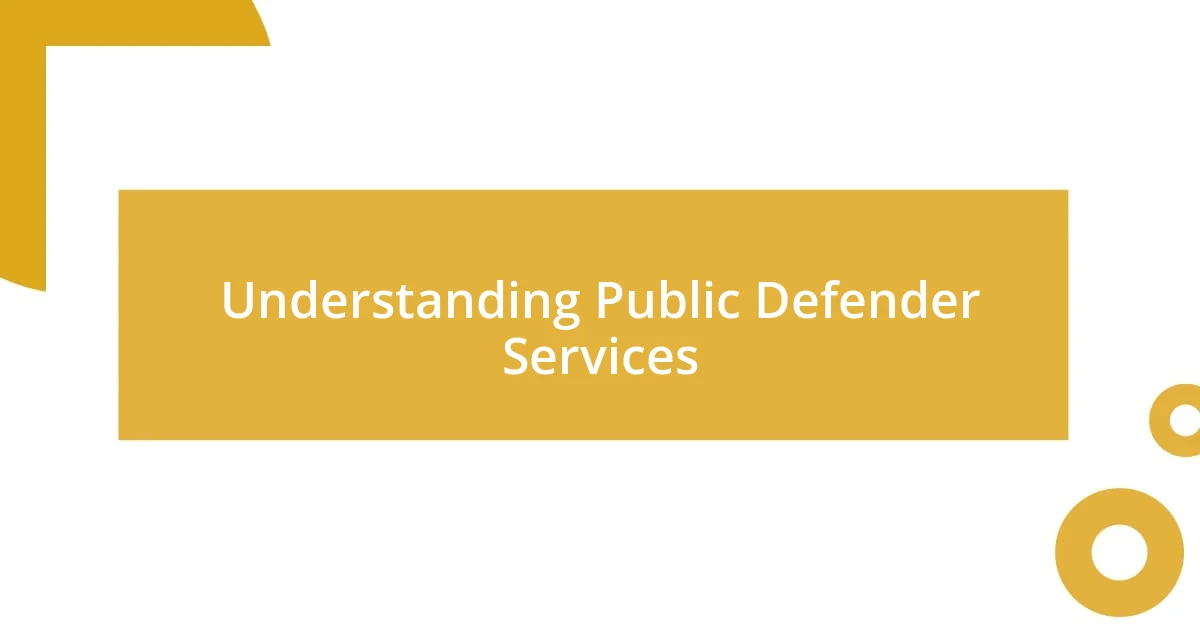
Understanding Public Defender Services
Public defender services play a critical role in the criminal justice system, ensuring that those who cannot afford an attorney still receive legal representation. I recall a time when a friend faced a serious charge and was represented by a public defender. It was an eye-opening experience to see how dedicated these attorneys can be, often working long hours for clients they believe in, despite heavy caseloads.
When we think about public defenders, it’s easy to overlook the immense pressure they face. Have you ever considered how many lives are impacted by their work? Each case they handle can carry deep personal consequences for their clients—dealing with potential prison time, family separation, or even the stigma of a criminal record. From my perspective, it’s essential to recognize the commitment these attorneys make under challenging circumstances.
I’ve often wondered how people would cope without public defenders. Imagine navigating the complexities of the legal system alone, with no guidance on your rights or options. The emotions of fear and uncertainty can be overwhelming, yet public defenders strive to provide a voice for the voiceless, helping to balance the scales of justice in our society.
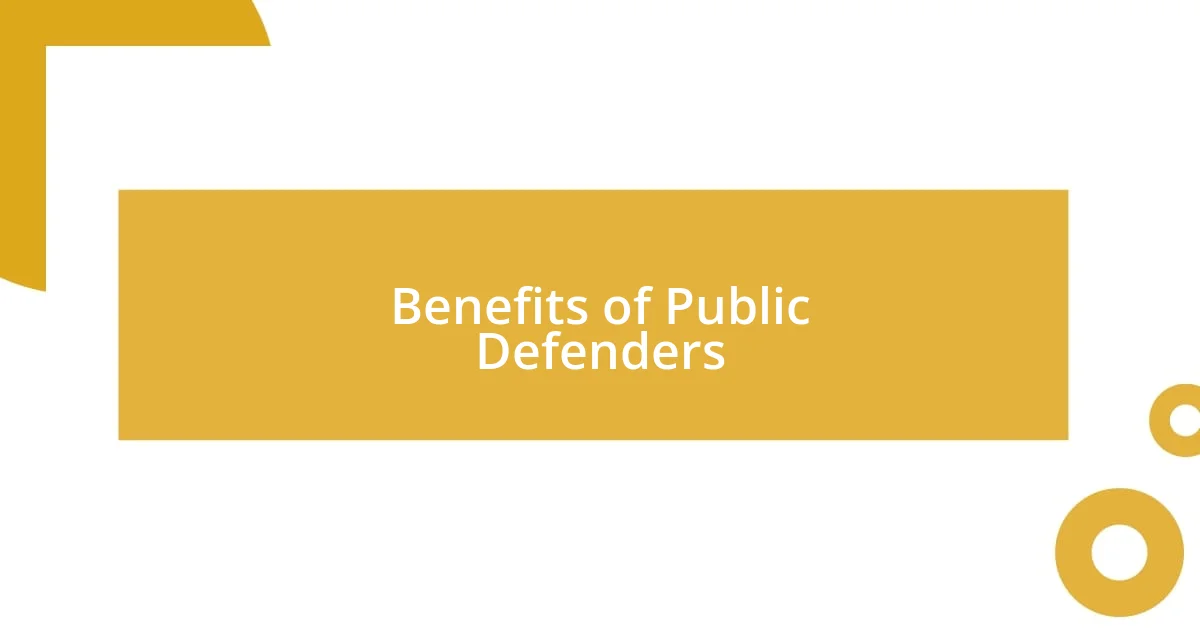
Benefits of Public Defenders
One of the most significant benefits of public defenders is their commitment to equitable legal representation. I’ve seen firsthand how they navigate through the intricacies of the law for clients who might otherwise slip through the cracks. They devote time and energy to understand each case, often going above and beyond to uncover key evidence or negotiate plea deals that can profoundly impact their clients’ futures.
- They provide access to justice for low-income individuals.
- Public defenders often have extensive experience with local courts, which can enhance case outcomes.
- Representing marginalized communities, they advocate for fair treatment.
- Their workload, while heavy, can foster a sense of camaraderie as they support one another in challenging cases.
Furthermore, the emotional and psychological support that public defenders offer can be a game-changer for clients. I’ve witnessed moments of relief when clients realize they’re not alone in their struggles. Public defenders don’t just advocate for their clients in court; they also lend a compassionate ear and guide them through an incredibly daunting process, which is often just as vital as the legal work itself.
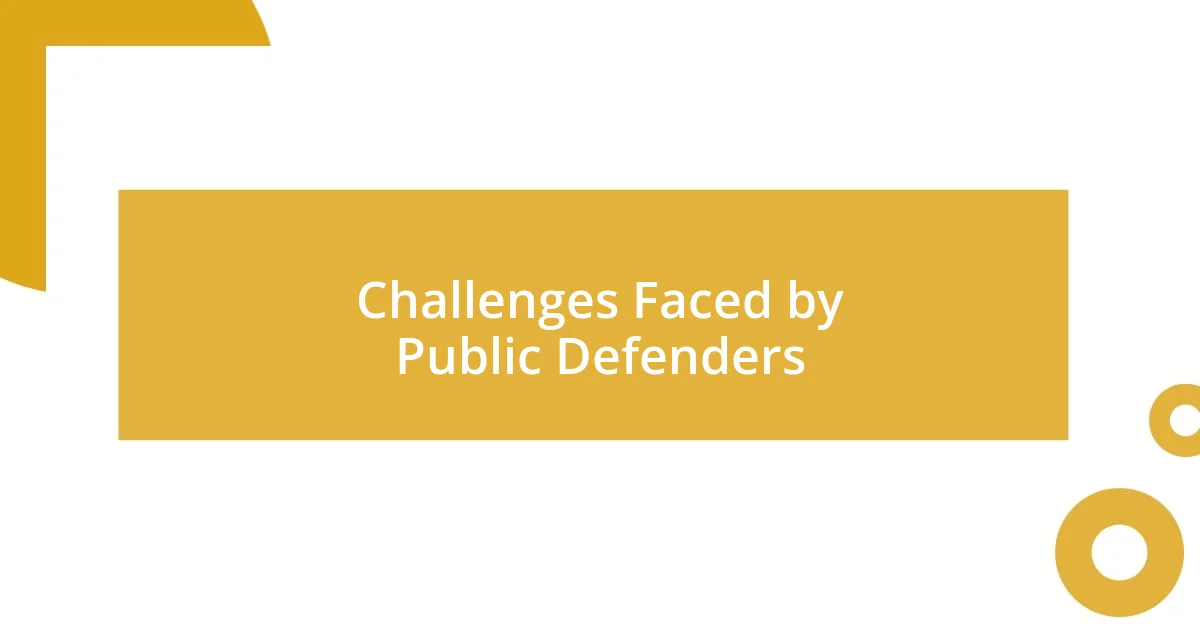
Challenges Faced by Public Defenders
Public defenders frequently operate under intense strain due to overwhelming caseloads. I’ve seen them juggling multiple cases at once, which can lead to inadequate attention for each client’s unique situation. This reality often leaves them feeling like they’re fighting an uphill battle, striving to provide quality defense while managing the relentless demands of their workload.
In addition to heavy caseloads, public defenders also face a shortage of resources. From what I’ve observed, many public defender offices struggle with limited funding, which impacts everything from access to expert witnesses to sufficient legal research tools. This lack of resources can create obstacles that hinder their ability to build strong defenses and ultimately impacts their clients’ outcomes.
Moreover, the stigma surrounding public defenders often adds to their challenges. I’ve talked to some who feel undervalued or misunderstood, not just by the public but sometimes even by those within the legal system. This emotional toll can be exhausting; yet, despite these struggles, the dedication to their clients remains unwavering. It’s a poignant reminder of the resilience required in this vital role.
| Challenge | Description |
|---|---|
| Overwhelming Caseloads | Many public defenders carry numerous cases, leading to insufficient attention for each individual client. |
| Resource Limitations | Funding constraints hinder access to vital legal tools and support that could strengthen defenses. |
| Stigmatization | Public defenders often face societal and systemic judgments, affecting their morale and self-perception. |
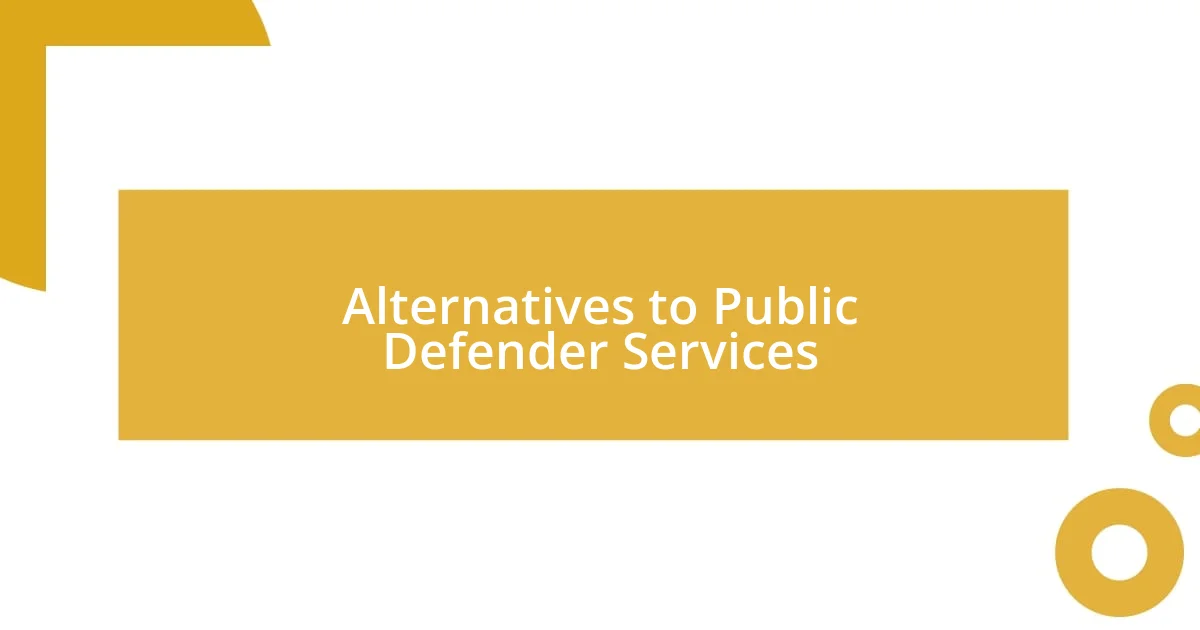
Alternatives to Public Defender Services
When considering alternatives to public defender services, private attorneys often come to mind. I recall a case where a friend opted for a private lawyer instead of a public defender. The difference was palpable; the private attorney dedicated more time and offered tailored strategies, creating a sense of assurance for my friend. But I often wonder: is that level of investment financially feasible for everyone?
Another option some people explore is legal aid organizations. In my experience, these groups often provide pro bono (which means free) services to those in need. I’ve seen firsthand the passion and dedication of the lawyers involved in these organizations, who strive to bridge the gap for individuals who might otherwise be left without adequate representation. Yet, with limited resources, they too can face challenges similar to public defenders, especially in terms of available manpower and funding.
Lastly, there are self-representation clinics, where individuals receive guidance on navigating the legal process without an attorney. I remember attending one of these sessions, and while the information was valuable, the complexity of legal language left many attendees bewildered. It made me realize that self-representation is only a viable alternative for those who can somewhat grasp the law. My question is: how can we ensure that every person, regardless of their background or knowledge, walks away feeling empowered and informed?
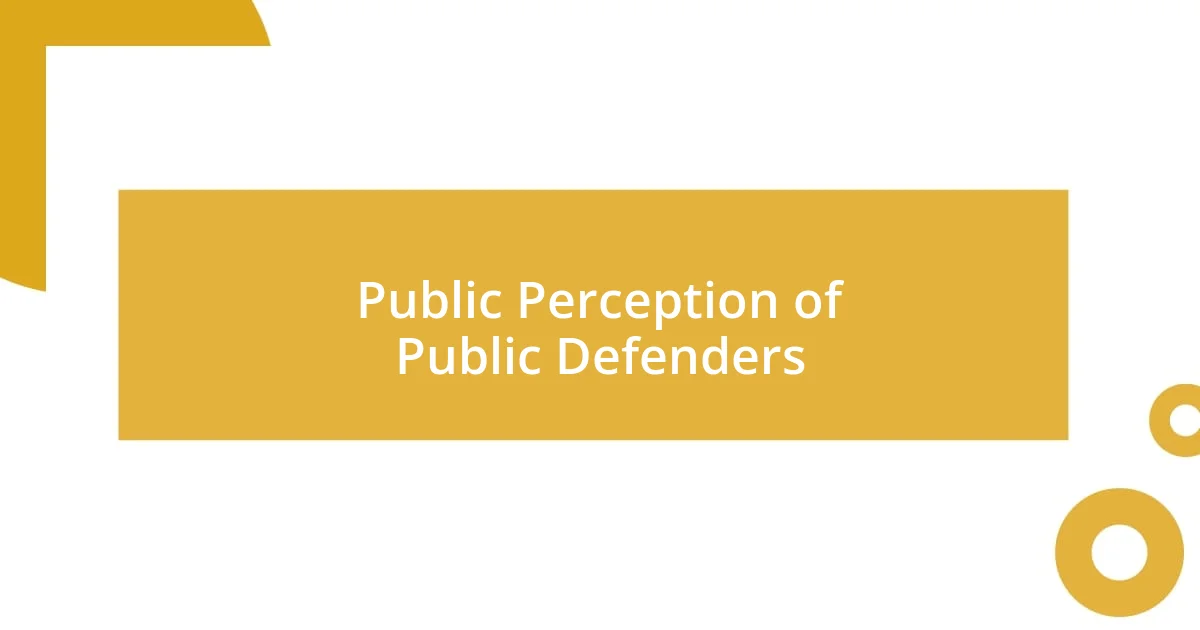
Public Perception of Public Defenders
When thinking about public perception of defenders, I realize it’s often mixed. Many people view them as overworked and underappreciated, yet some still carry the stereotype that they’re just as competent as private counsel. I remember chatting with a neighbor who was baffled by my defense attorney’s choice of career. “Why would anyone want to defend criminals?” he asked. It struck me how little understanding there is about the critical role public defenders play in our justice system.
In my own experience, I’ve seen public defenders work tirelessly for their clients, often facing skepticism from family and friends when I mention my support for them. It’s disheartening how easily the public dismisses their commitment due to preconceived notions about who their clients are. I once walked into a courthouse while supporting a friend’s case and overheard someone say, “They must be in it for the paycheck.” That really made me think about how much society fails to recognize the passion and ethics these defenders uphold, often against tough odds.
One thing I find fascinating is how the narrative can change based on personal stories. Have you ever heard someone share a positive experience about a public defender? I did, and it opened my eyes. A colleague once recounted how his public defender not only fought fiercely for him but also took the time to explain every step of the process. This personalized attention made him feel valued, turning a typically impersonal legal system into something humane. It brings me to wonder, what if more people recognized these defenders for the integral support they provide in our society, rather than just as a fallback option?
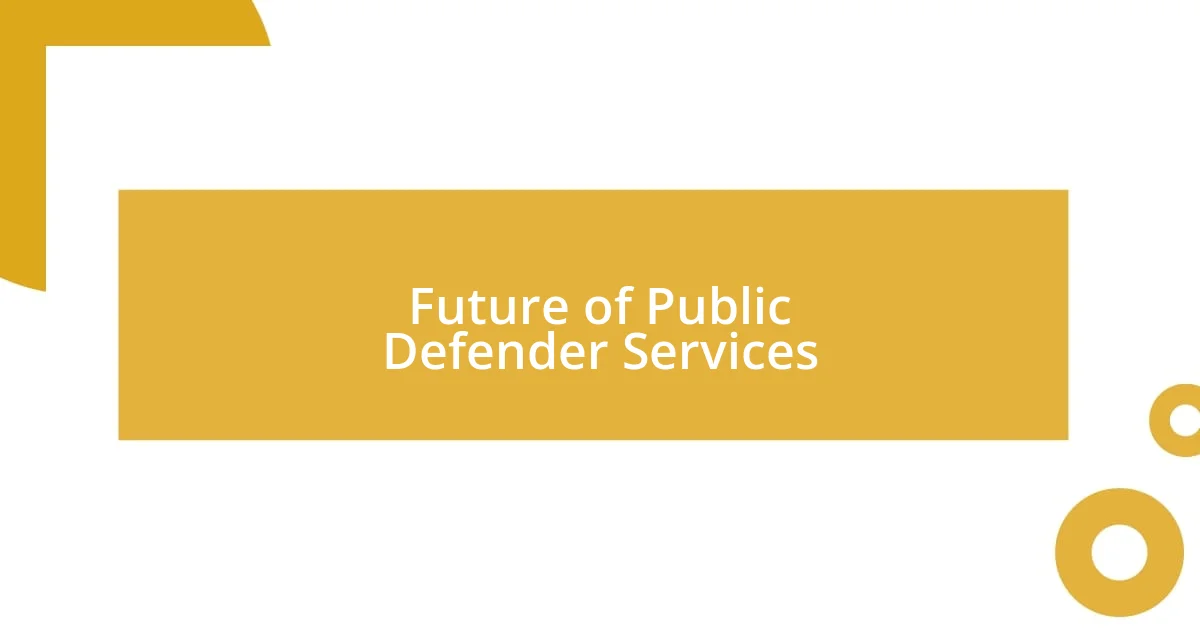
Future of Public Defender Services
As I think about the future of public defender services, I can’t help but feel a sense of urgency for reform. With rising caseloads and limited funding, it’s clear that without systemic change, their effectiveness will continue to dwindle. I remember reading about a state where public defenders’ workloads averaged nearly 150 cases a year—unmanageable, right? How can one person truly advocate for so many, and what implications does this have for justice?
Advancements in technology could play a pivotal role in shaping public defender services moving forward. Imagine the potential of digital tools that streamline case management and facilitate remote consultations with clients. In my experience, having quick access to relevant data can make a significant difference. It raises the question: if we leverage technology to enhance efficiency, will we also improve the quality of defense for those who need it most?
Moreover, the conversation around funding must evolve. Currently, many public defender offices operate on shoe-string budgets, which is simply not sustainable. I believe there’s a ripple effect here; better funding can attract talented attorneys who are passionate about social justice. Isn’t it time we prioritized the rights of the accused just as much as we do the resources for the prosecution? The future of public defender services hinges on support from both the community and legislative bodies.









